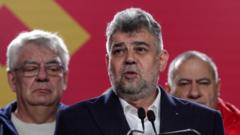In a dramatic shift, Romania’s political scene faces instability after PM Marcel Ciolacu resigns and exits government following George Simion's significant win in the presidential elections.
Romanian PM Steps Down as Coalition Crumbles Following Nationalist Victory

Romanian PM Steps Down as Coalition Crumbles Following Nationalist Victory
Romanian Prime Minister Marcel Ciolacu resigns after a nationalist party's electoral success shakes the political landscape.
Marcel Ciolacu has stepped down as Romania's Prime Minister, and his Social Democrat party is withdrawing from the coalition government after a nationalist candidate, George Simion, emerged victorious in the first round of the presidential elections held on Sunday. Simion, a eurosceptic campaigning on "Romania first," garnered 40.9% of the votes and is anticipated to secure a win in the upcoming run-off on May 18, against Bucharest Mayor Nicușor Dan, who narrowly defeated the Social Democrat candidate.
This electoral outcome has plunged Romania, a key EU member situated on NATO's eastern border, into yet another phase of political chaos. Ciolacu, 57, cited the coalition's inability to fulfill its goals and its lack of legitimacy as reasons for his party's exit from the government. Only a few months into power after the 2024 elections, the coalition has struggled to maintain unity, as Simion’s far-right party, alongside two others, secured approximately one-third of the total votes.
In response to the election results, coalition parties convened in emergency meetings to strategize their next moves. Simion’s victory appears to reflect widespread public disenchantment, particularly in light of the annulment of presidential elections last year, an event that has raised tensions in European capitals and Kyiv. He has voiced intentions for an EU built on strong, sovereign nations and has opposed military support to Ukraine.
Ciolacu’s resignation will lead him to submit his departure to interim president Ilie Bolojan, who will subsequently appoint a caretaker prime minister. Bolojan has been acting as interim president since February, following a scandal surrounding annulled elections.
Independent monitoring group Funky Citizens issued a warning that Romania may experience up to 45 days of political instability as a result of Ciolacu’s resignation, highlighting the dangerous power vacuum that emerges at a time when strong leadership is crucial. Ciolacu acknowledged that one of the main objectives of the coalition—pursuing a joint presidential candidate—has failed, indicating that a new coalition must take root to govern effectively.
The leader of Ciolacu's liberal coalition ally, Catalin Predoiu, expressed the need for a prime minister who is capable of facing current challenges. Criticism surfaced from within the party ranks, with the Social Democrat mayor of Buzau stating that the party had disgraced itself due to poor decisions by leadership.
George Simion, 38, has presented himself as a nationalist figure similar to US President Donald Trump. His surge in popularity notably came after the banning of Calin Georgescu, a far-right candidate. The annulment of Georgescu’s November election victory, mired in allegations of Russian interference, has significantly shaped the current political climate.
Simion has positioned himself as a voice for Romanians who feel overlooked and oppressed. His campaign has strongly opposed Romania’s financial aid to Ukrainian refugees, though he firmly denies being pro-Russian. The political analyst Radu Albu-Comanescu remarked that the election results signify a radical opposition to the current political status quo.
Elena Calistru asserted that Romania is undergoing a remarkable political reset, as both Simion and Dan emerge as anti-establishment figures with contrasting platforms. The consequences of this election will be pivotal in determining whether Romania’s desire for change can foster constructive political reform or trend toward anti-European sentiment.



















